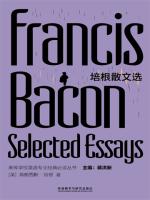培根散文选
Title: The Wisdom of Francis Bacon: A Review of "Essays"
"Essays" by Sir Francis Bacon is a collection of short, aphoristic essays written by the English philosopher, statesman, and scientist. First published in 1597, the work was expanded over several editions, culminating in a final version of fifty-eight essays in 1625. Bacon's essays are renowned for their wit, brevity, and profound insights into human nature and the conduct of life, making them enduring works of literature and philosophy.
Introduction
Bacon's "Essays" is a cornerstone of English literature, offering readers a window into the mind of one of the most influential thinkers of the Renaissance. The essays cover a wide range of topics, from the nature of truth and the virtues of friendship to the pitfalls of ambition and the complexities of love. The collection is a testament to Bacon's belief in the power of knowledge and the pursuit of wisdom.
Themes and Insights
One of the most striking aspects of Bacon's essays is the breadth of topics they address. Each essay is a standalone piece, yet they collectively form a mosaic of Renaissance thought. The essays touch upon themes such as:
- The nature of truth and the importance of skepticism in "Of Truth."
- The value of friendship and the dangers of flattery in "Of Friendship."
- The moral implications of revenge in "Of Revenge."
- The virtues of travel and the broadening of the mind in "Of Travel."
- The role of education and the importance of practical knowledge in "Of Studies."
Bacon's insights are not merely theoretical; they are grounded in a deep understanding of human behavior and the world. His essays are filled with practical advice, reflecting his belief in the application of knowledge to improve one's life and society.
Literary Style and Language
Bacon's writing style is characterized by its clarity, precision, and eloquence. His use of language is direct and unadorned, yet it carries a weight of meaning that belies its simplicity. The essays are structured around a central theme, with Bacon presenting his arguments in a logical and coherent manner. His prose is marked by the use of antithesis, a rhetorical device that juxtaposes contrasting ideas to emphasize a point.
Philosophical Underpinnings
At the heart of Bacon's essays lies a philosophical inquiry into the nature of knowledge and the human condition. He advocates for empirical observation and inductive reasoning, which would later become foundational principles of the scientific method. His essays reflect a deep skepticism of received wisdom and a call for a more grounded approach to understanding the world.
Influence and Legacy
The influence of Bacon's "Essays" extends beyond the literary sphere. His ideas have shaped the development of modern science, philosophy, and political thought. The essays have been widely read and admired by statesmen, scholars, and the general public alike, and they continue to be studied and referenced in contemporary discussions on ethics, politics, and the pursuit of knowledge.
Conclusion
In reviewing "Essays" by Francis Bacon, one cannot help but be struck by the timeless relevance of his thoughts. His exploration of the human experience is both profound and accessible, offering wisdom that remains applicable in the modern age. The essays are a testament to Bacon's intellectual prowess and his commitment to the pursuit of truth and understanding.
Bacon's "Essays" is more than a collection of writings; it is a philosophical journey that invites readers to reflect on the complexities of life and the pursuit of wisdom. The essays stand as a monument to the power of the written word to inspire, challenge, and enlighten. For anyone seeking to understand the world and one's place within it, Bacon's essays offer a wealth of insight and a model of intellectual rigor.



 京公网安备 11010802032529号
京公网安备 11010802032529号